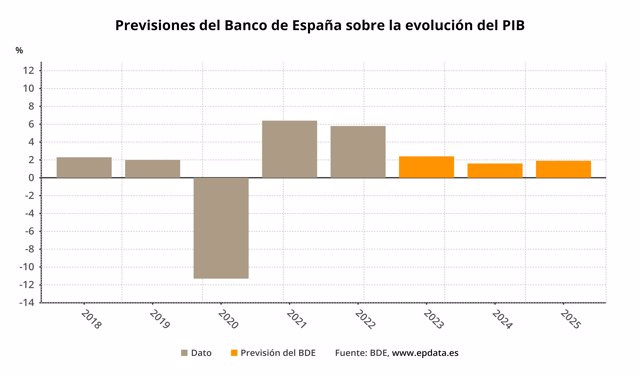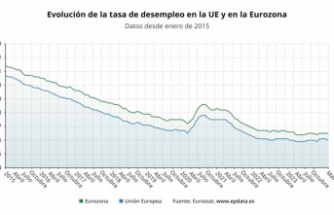Warning of a high structural public deficit and public debt if the possible extension of anti-crisis measures is not compensated
MADRID, 19 Dic. (EUROPA PRESS) -
The Bank of Spain has raised its growth forecast for the Spanish economy for 2023 from 2.3% to 2.4%, but has cut its estimates for 2024 from 1.8% to 1.6% and has lowered its projections for 2025 from 2% to 1.9%, due to less favorable prospects for the future evolution of household consumption.
The general director of Economy and Statistics of the Bank of Spain, Ángel Gavilán, has pointed out that although the prospects for the economy in the coming years are "relatively favorable and solid" -especially in comparison with the EU--, it continues It is necessary to address "with ambition" some of the main burdens that have conditioned economic activity in recent decades, such as low productivity, the high unemployment rate or the considerable fiscal imbalance.
According to the report published by the organization directed by Pablo Hernández de Cos, after the high dynamism that economic activity showed in the final stretch of 2022 and at the beginning of 2023, the growth of GDP will slow down between 2023 and 2024, from 2.4 % to 1.6%, before accelerating slightly again in the 2025-2026 biennium, when it will reach rates of 1.9% and 1.7%, respectively.
This evolution responds to the fiscal impulse coming from the European funds program 'Next Generation EU' and the gradual reactivation of the European economy, as well as the path of moderation of inflation and the consequent recovery of the real incomes of the agents that is expected along the projection horizon.
The fact that the negative impact of the tightening of monetary policy on activity will peak next year will also contribute to the expected acceleration in the pace of GDP growth in the 2025-2026 biennium.
Even taking into account that household consumption will be the main driver of growth in 2024, the Bank of Spain has warned that the information provided by the European Central Bank points to a worse performance of this component of demand in the coming quarters. .
This relative moderation in consumption would be explained, at least in part, by the lower support that families expect to have in the future from consumer credit, in a context in which in recent months households have perceived a certain deterioration in their access. to external financing.
Regarding the labor market, the Bank of Spain estimates that employment will moderate its dynamism throughout the projection horizon, in line with the expected evolution of activity and with the assumption of a certain recovery in productivity.
As a result of all this, the Bank of Spain foresees an unemployment rate of 12.1% in 2023; 11.7% in 2024; 11.4% in 2025 and 11.3% in 2026, which would be below the historical average observed in the last four decades (16.8%), but above the historical minimum reached in 2007 (8.2% ).
Regarding the evolution of prices, the Bank of Spain estimates that general inflation will be 3.4% on average in 2023 and will reduce to 3.3%, 2% and 1.9% in 2024, 2025 and 2026, respectively.
Compared to September projections, the general inflation rate is revised downwards by two tenths in 2023, due to the surprises registered in the energy component in recent months. Likewise, the new projections incorporate a downward revision of one percentage point for 2024 and an upward revision of two tenths for 2025.
The 2024 review is mainly explained by lower energy prices for the coming quarters and an extension of the reduction in VAT on food and the subsidy for public transport until June and December 2024, respectively.
However, it specifies that if the Government decided to also extend the VAT reduction on electricity and gas to all of 2024, inflation would drop one more point next year, to 2.3%, and GDP would grow two tenths more. at 1.8%.
Regarding underlying inflation, the Bank of Spain estimates that it will reach an annual average of 4.1% in 2023, will reduce to 1.9% in 2024 - in a context of lower economic growth - and will remain around these records in the subsequent biennium.
Alert, however, that the rate of variation of the Harmonized Consumer Price Index (HICP) for energy, which in the average for July-November of this year has been -16%, will rise to a rate around to 15% in mid-2024, a rate that, however, is 10 percentage points (pp) below that forecast in September.
From this perspective, the organization estimates that negotiated salaries will evolve in line with the latest Agreement for Employment and Collective Bargaining, and will register annual increases of around 3% in the period 2024-2026, while margins are expected to Businesses will continue on the path of moderation that they began in early 2023.
Overall, in line with the developments observed to date, it is expected that there will be no significant second-round effects via wages or business margins that could trigger feedback processes of current inflationary pressures.
In its new projections, the Bank of Spain worsens its estimates of the deficit for 2023 and places it at 3.8%, one tenth more than the previous projection. For 2024, the forecast remains at 3.4%, four tenths higher than the Government's projections, while in 2025 it is projected at 3.6% (compared to 4.1% of the previous estimate).
Regarding debt to GDP forecasts, the estimates for 2023 are 107.3%, better than the previous 108.8%; of 106.3% in 2024 (compared to 106.9% last) and 107.2% in 2025 (less compared to 107.9%). The Bank of Spain has warned that, by 2026, it will rise to 108.4%.
Apart from the risks associated with international geopolitical developments and the tightening of monetary conditions, the Bank of Spain has warned that at the national level there are doubts about the withdrawal, at the end of 2023, of some of the measures that the authorities deployed to address the energy crisis.
An eventual extension of these last measures could result, in 2024, in a greater moderation of inflation and greater dynamism of activity. However, the agency has warned that, in this hypothetical scenario, from the moment these measures expire, opposite effects would be observed on activity and prices.
Furthermore, in the absence of compensatory fiscal actions, it would result from the persistence of a high structural public deficit and public debt, especially in a context of higher financing costs and the reactivation of European fiscal rules.
Doubts also remain regarding the pace of execution of the projects associated with the 'NGEU' program and their impact on activity, while there has been an increase in the percentage of Spanish companies that point to uncertainty about economic policies as a factor that conditions their activity.
"If they continue, these dynamics could have a negative impact on the future growth path of the Spanish economy," the Bank of Spain concludes its report.













